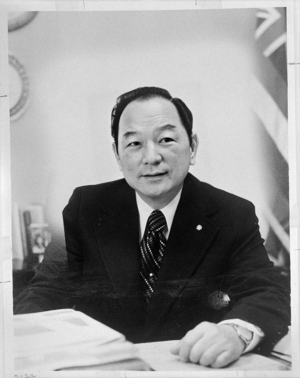Spark Matsunaga facts for kids
Quick facts for kids
Spark Matsunaga
|
|
|---|---|
 |
|
| United States Senator from Hawaii |
|
| In office January 3, 1977 – April 15, 1990 |
|
| Preceded by | Hiram Fong |
| Succeeded by | Daniel Akaka |
| Member of the U.S. House of Representatives from Hawaii |
|
| In office January 3, 1963 – January 3, 1977 |
|
| Preceded by | Constituency established |
| Succeeded by | Cecil Heftel |
| Constituency | At-large (1963–1971) 1st district (1973–1977) |
| Personal details | |
| Born |
Masayuki Matsunaga
October 8, 1916 Kukuiula, Territory of Hawaii, U.S. |
| Died | April 15, 1990 (aged 73) Toronto, Ontario, Canada |
| Resting place | National Memorial Cemetery of the Pacific |
| Political party | Democratic |
| Spouses |
Helene Matsunaga
(m. 1951) |
| Children | 5 |
| Education | University of Hawaii, Manoa (BA) Harvard University (LLB) |
| Military service | |
| Allegiance | |
| Branch/service | |
| Years of service | 1941–1945 |
| Rank | |
| Unit | 442nd Regimental Combat Team 100th Infantry Battalion |
| Battles/wars | World War II |
Spark Masayuki Matsunaga (October 8, 1916 – April 15, 1990) was an important American politician and lawyer. He served as a United States Senator for Hawaii from 1977 until he passed away in 1990. Matsunaga also represented Hawaii in the U.S. House of Representatives. He was a member of the Democratic Party. He helped create the United States Institute of Peace. He also worked to get apologies and payments for Japanese-Americans who were held in detention camps during World War II.
Contents
Early Life and Military Service
Spark Matsunaga was born Masayuki Matsunaga on October 8, 1916. He was born on the island of Kauai in what was then the Territory of Hawaii. His parents had moved to the United States from Japan. When he was eight years old, he got the nickname "Sparky." This nickname came from a comic strip character named Spark Plug.
In 1941, he earned a bachelor's degree in education from the University of Hawai'i. After the Attack on Pearl Harbor, Matsunaga, who was a second lieutenant in the U.S. Army, was sent to a detention camp. This camp was located in Wisconsin. He and other Japanese-Americans who were held there asked President Franklin D. Roosevelt for permission to form a military unit. They formed the 100th Infantry Battalion.
Matsunaga was injured twice while fighting in Italy during World War II. He served with the famous 442nd Regimental Combat Team. He left the Army as a Captain. After the war, Matsunaga went to Harvard Law School and graduated in 1951.
Political Career in Hawaii and Washington
After law school, Matsunaga worked as a prosecutor. He also served in the Hawaii territorial House of Representatives. This was before Hawaii became a state.
When Daniel Inouye was elected to the Senate, Matsunaga took his place in the United States House of Representatives. He represented all of Hawaii at first. Later, Hawaii was divided into districts. Matsunaga was elected to represent the Honolulu area. He held this position until 1976.
In 1976, Senator Hiram Fong was retiring. Matsunaga ran for the Senate and won the Democratic Party nomination. He then won the general election against William F. Quinn. Matsunaga served as a United States Senator from 1977 until his death in 1990.
Key Achievements in Congress
Matsunaga worked hard on several important projects.
- United States Institute of Peace: In 1984, after many years of effort, Congress passed a bill to create the U.S. Institute for Peace. This organization works to prevent and resolve conflicts around the world.
- Poet Laureate Position: For 22 years, Matsunaga worked to create the position of United States Poet Laureate. This person is a special consultant in poetry for the Library of Congress. In 1985, his bill finally passed.
- Redress for Japanese-Americans: Matsunaga was very important in passing a bill that provided payments and an apology to people of Japanese descent. These individuals had been held in detention camps in the United States during World War II. The bill provided $20,000 to each person and offered an official apology.
Matsunaga was also known for his great sense of humor. One time, at a White House event, the Secretary of State Alexander Haig mistook Matsunaga for a member of the Japanese delegation. Haig asked him if he spoke English. Matsunaga famously replied, "Yes, Mr. Secretary, I do — and I had the honor of voting for your confirmation the other day."
Personal Life and Passing
Spark Matsunaga was married to Helene Hatsumi Tokunaga. They had three daughters and two sons.
Matsunaga passed away in Toronto, Canada, on April 15, 1990, at the age of 73. He had been battling prostate and bone cancer. His casket was placed in the rotunda of the Hawaii State Capitol in Honolulu.
Legacy and Honors
Spark Matsunaga left a lasting impact.
- His Papers: In 1997, his wife donated his official papers to the University of Hawaii at Manoa. These included thousands of documents, photos, and videos from his 28 years in Congress. They also contained personal items and materials from his Army service.
- Statue and Garden: A bronze statue honoring him is in the Spark M. Matsunaga International Children's Garden For Peace. This garden is at the Storybook Theatre of Hawaii in his hometown of Hanapepe, Kauai.
- Other Honors: Matsunaga's portrait appears on some U.S. Series I Bonds. An elementary school in Germantown, Maryland, and a hospital in Honolulu are also named after him.
See also
- List of Asian Americans and Pacific Islands Americans in the United States Congress
- List of United States Congress members who died in office (1950–99)
 | Leon Lynch |
 | Milton P. Webster |
 | Ferdinand Smith |

